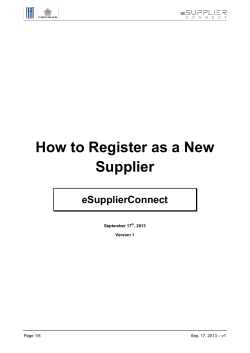
Fact Sheet No. 4
Fact Sheet No. 4 What is the Optional Protocol to the ICESCR? What is an Optional Protocol? An Optional Protocol enables individuals to seek justice internationally, if they have been denied access to justice domestically. It is attached to a “parent” treaty, in this case the ICESCR. It is a separate legal text which establishes a stronger mechanism for accountability, generally including both an individual complaints process (known formally as a “communications procedure”) and an “inquiries procedure” which enables the Committee to investigate of its own volition. In the UN Human Rights Treaty System, an Optional Protocol grants the human rights Committees judicial powers. That is, through an Optional Protocol a Committee can begin to review individual complaints in a similar way to that of a traditional human rights court. Also, in cases of grave and systematic violations of human rights, some Committees can initiate an investigation in an attempt to hold States Parties accountable. If you want to find out whether or not your country is a State party to the ICESCR, you can check this information at the website of the Office of the High Commissioner for Human Rights website – www.unhchr.ch How other communications/inquiries processes work Most of the other treaties in the UN Human Rights Treaty System have a capacity to receive individual communications or launch inquiries: • the Human Rights Committee, which monitors the International Covenant on Civil and Political Rights, can receive individual communications, and can initiate an “urgent action” processes in cases of imminent danger; • the Committee on the Elimination of Racial Discrimination, which monitors the International Convention on the Elimination of all forms of Racial Discrimination, can receive individual communications, and can initiate “early warning” and “urgent action” processes in cases of concern or imminent danger; • the Committee on the Elimination of Discrimination Against Women, which monitors the Convention on the Elimination of all forms of Discrimination Against Women, can receive individual communications and launch investigations of grave or systematic breaches; • the Committee Against Torture, which monitors the Convention Against Torture and Other Cruel, Inhuman or Degrading Treatment or Punishment, can receive individual communications and launch investigations into the systematic practice of torture; and • the Committee on the Protection of the Rights of All Migrant Workers and Members of Their Families, which monitors the International Convention on the Protection of the Rights of All Migrant Workers and Members of Their Families, can receive individual communications. Coalition for an OP to the ICESCR Advocacy Kit What is the OP to the ICESCR? How the process works The communications processes attached to treaties can only be used in countries which have ratified both the parent treaty and the communications process. To lodge a “case” with one of the Committees, an individual needs to have experienced a breach of the human rights contained in a particular treaty. They also need to have tried to achieve justice for that violation through domestic processes. If that has been unsuccessful, or there were no avenues for redress, then they can lodge a communication with the appropriate Committee. One of the challenges is to pick which treaty is most applicable. Once the Committee has received the communication, they consider whether or not it is admissible, that is whether or not it really fits the rights in “their” treaty. If they decide that the case is admissible, they then consider the “merits” of the case to determine whether a breach occurred. If they find that a breach occurred they can make a series of recommendations to the government; their “views” on appropriate “remedies”. The views focus on providing relief for the individual, but also identify the violations and cause of the violations, and as such, can be used in domestic advocacy campaigns to change those laws, policies or programs. Governments are then required to consider the recommendations, take appropriate actions, and report back to the Committee within a specified time-frame. The Committees also have the power in the early stages to require States Parties to take “interim measures” to avoid possible irreparable damage to the victim or victims of the alleged violation. Further information on the Optional Protocol to the ICCPR An Optional Protocol allowing for individual complaints under the ICCPR came into force in 1976 and since them has demonstrated a number of benefits. As of December 2002, 104 States had ratified the Optional Protocol to the ICCPR. Thanks to the individual complaint procedure, several countries have changed their laws, in a number of cases prisoners have been released and compensation paid to the victims. Moreover, a wider consensus has been achieved on the content of the obligations undertaken by the States parties to the ICCPR. The presence of the Optional Protocol has allowed victims to obtain restitution and redress for violations of their civil and political rights and has contributed to the implementation of the rights enshrined in the ICCPR. Further information on the Optional Protocol to CEDAW What is important to know about this OP is that it took 3 years to make it happen! Serious work on the instrument began in 1996, negotiations started in 1997 and by December 1999, the text had been adopted and was open for signature to States parties to CEDAW. In less than four years, of the 167 States Parties to CEDAW 75 have signed the OP and of those, 49 have ratified it. The OP to CEDAW is the only OP that establishes an inquiry procedure through which the CEDAW Committee can launch an inquiry into grave and systematic violations of women’s rights in a particular country at its own initiative. Until now, no communications or inquiries have been fully reviewed by the CEDAW Committee. However, contributions to the development of ESCR jurisprudence are likely to be made. Coalition for an OP to the ICESCR Advocacy Kit What is the OP to the ICESCR?
© Copyright 2025





















